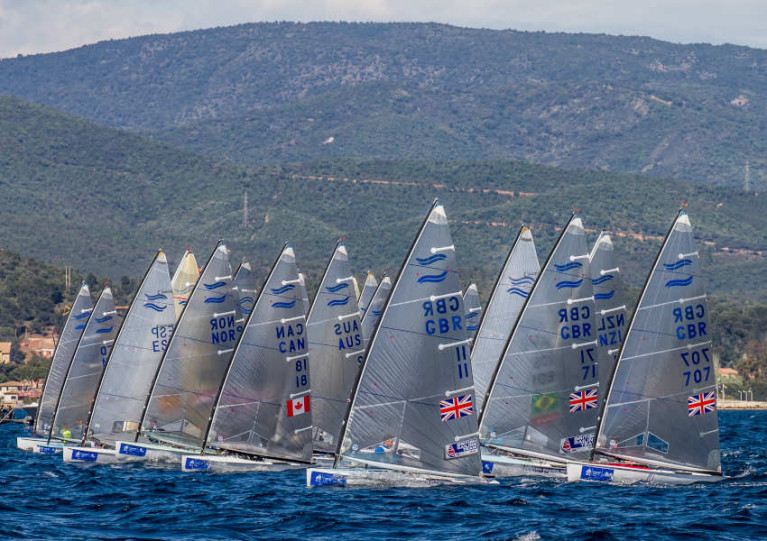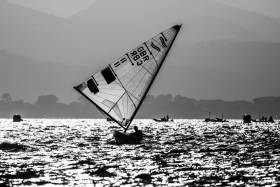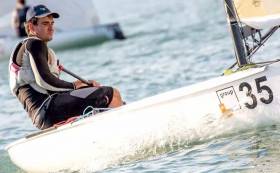Displaying items by tag: Finn class
Entries Now Open for 2021 Finn Europeans in Hyères
The Notice of Race for the 2021 Open and U23 Finn European Championship has been published and registration is also now open.
The 66th Finn Europeans will take place in Hyères, France from 16-23 April.
Registration runs until 31 January for the first round, with the second round from 15 February to 15 March. The schedule includes three days of measurement followed by a 10-race series from Monday 19 to Friday 23 April.
The championship is part of a carefully planned event strategy for the class that leads from Palma’s Trofeo Princesa Sofia in March through to the Finn Gold Cup in Porto, Portugal in May, after which many sailors will head back to Tokyo to prepare for the Olympics.
International Finn Association president Balazs Hajdu said: “This year proved that Covid-safe events could take place and we are delighted that the 2021 Open and U23 European Championship will be held in Hyères as part of the iconic Semaine Olympique Française, an event that the Finn class has been involved in since the very beginning of its history.
“I am sure that the French organisers will provide perfect Finn races as the sailors prepare not only for the final Olympic qualification event, but also for the 2020 Olympic Games in Tokyo three months later.
“I would like to thank all those involved in putting this event together with great cooperation in showcasing our amazing sailors at this quintessential event in the sailing world.”
Hajdu also expressed his hopes that Tokyo 2020 “will not be the last year for the Finns on the Olympic circuit”, following the IOC’s recent postponement of its decision on its would-be replacement, the Mixed Offshore Keelboat event, for Paris 2024.
The most recent Finn Europeans were held at Gdynia in Poland, where Northern Ireland sailor — and solo Olympic campaigner — Oisin McClelland recorded a personal best and finished 23rd in the overall standings.
'Finn Dinghy is Collateral Damage' - Olympic Games Statement from the International Finn Association
The International Finn Association (IFA) is extremely disappointed to see the decision taken today at the World Sailing AGM in Sarasota, USA, to exclude any event options for the Finn in favour of adopting the Mixed Two-Person Keelboat.
Most of all we are very disappointed for the many committed Finn sailors affected by this decision, especially the young sailors who have had their campaign ambitions for 2024 cruelly shattered.
We feel the Finn class has become collateral damage in the quest for gender equality and Olympic TV rights income for World Sailing.
"We feel the Finn class has become collateral damage in the quest for gender equality and Olympic TV rights income for World Sailing"
It is a great injustice that many of the best athletes in the sport of sailing no longer have an avenue to the Olympics, and we honestly feel the Olympics will be poorer as a result of the exclusion of the Finn.
We know the Finn class will continue to thrive and for the time being we will focus on supporting our athletes as they prepare for Tokyo 2020. In the coming months, the IFA will work towards finding a way back for the Finn on the Olympic programme.
Balazs Hajdu
IFA President
Fionn Lyden Pulls Out of Finn Europeans Due To Illness
Illness has forced Balimore’s Fionn Lyden to withdraw from the Finn Europeans getting underway in Cadiz today, Friday 9 March.
Irish Sailing’s James O’Callaghan confirmed the news as sailors from across Europe take to the waters of Andalusia ahead of the first races next Monday.
Lyden’s illness means that Oisin McClelland of Donaghadee Sailing Club will be the only Irish representative among the near 100-strong field as he progresses his Tokyo 2020 campaign.
Afloat.ie has more on the first big test of the year for Finn sailors gearing up for the Olympic qualifier this summer in Denmark.
































































